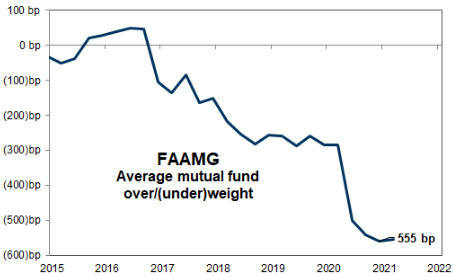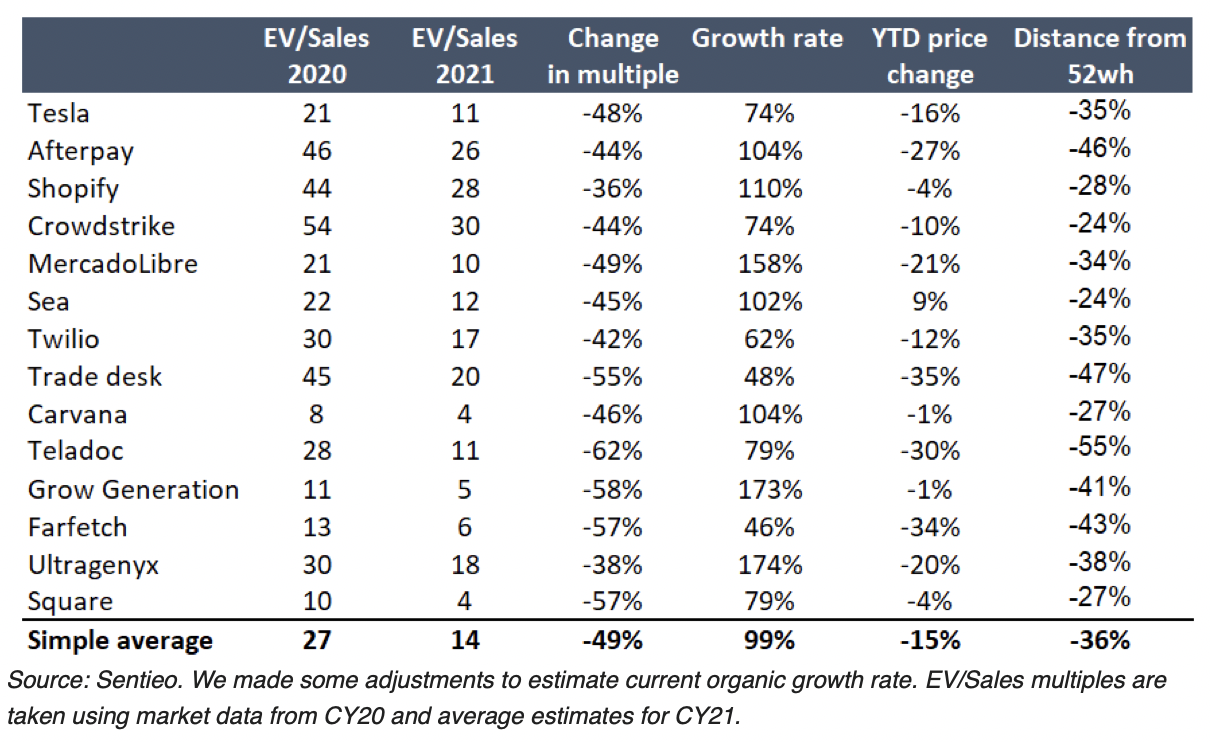Now is the time to allocate to growth
There has been a sharp rotation out of growth and steep sell-off in technology since the speculative highs of February. Of course, moments like this offer rare opportunities to allocate to rockstar technology companies that can rally for years on end.
This is one of those moments where stocks are down but fundamentals are up, and we expect the opportunity to be as fleeting as it usually is.
Now that some time has passed it's possible to see what happened under the hood, and that the rotation has been driven by institutional selling. As seen last year, when some of the most feted investors panic-sold at the lows, it often behooves an astute investor to take the other side of such overconfident and indiscriminate flows.
Tech outflows are now greater than they have been at any time since late 2018 - which marked the most recent exceptional entry point.

Companies like Afterpay, Shopify, Tesla, Carvana, and Twilio posted exceptional returns from those lows.
Mutual funds are systematically underweight technology, setting themselves up for continued systematic underperformance:

And if it's hard to believe that fund managers are still sceptical about technology - after all these years - this data was matched by BAML's fund manager survey:

This shows the extent of the swing from bullish to bearish and why now looks such a good time to allocate.
This is not just a US phenomenon.
Many Australian institutions and superannuation funds are run by those sceptical of technology who spent formative years in the aftermath of the US tech bust, and have been determined to avoid anything like that ever since.
That certainty came at a cost: missing 20 years of growth and innovation in e-commerce, search, social, renewable energy, software and the life sciences. This must change, and will change, but that's a topic for another post.
Multiples are now down ~50% from the start of the year, using estimates for CY21, and we have been net buyers over the last two weeks.

Inflation
The latest global market fall was triggered by a US Inflation print of 4%. So why is the Fed so relaxed?
One reason is that the year-on-year number is flattered by being compared to the same time last year, when consumer prices actually fell.
Another is that there has been a clear change in policy preference towards full employment.
This is very welcome.
One of the hangovers of 2008/2009 was stagnant wages. The policy switch to full employment disproportionally benefits disadvantaged members of society, who are far more likely to find work when labour markets are tight.
Similarly, lower income earners are also beneficiaries, as are those in the corporate world. The impact of a few extra dollars on those with none is much greater than that on those with many, which might explain the recent consumer boom and why e-commerce has continued to roar as economies open up.
The SPAC bust-up continued and rightly so. CEOs that published financial forecasts out to CY25 are already beginning to downgrade, in some cases only weeks after marketing those same forecasts to new investors. It's a great time to have a SPACable company - those sponsors will become increasingly desperate to do a deal.
Exacerbating the moves are the many retail investors who bought their first shares in March or April last year and have had a brilliant run. They are now experiencing their first sell-off. Some have accumulated hundreds of thousands of followers, so watching them manage their first sell-off on Twitter in real-time is quite a sight.
Our view is that inflation is likely to benefit our companies, as they all have extensive pricing power, as seen in their ability to grow during the short-lived contraction of 2020.
Having said that, we think multiples are past their highs of this cycle, so returns from here will be driven by fundamentals. Through this reporting season, we’ve had an opportunity to glimpse under the hood and see how companies are tracking, and make sure we own a portfolio of winners only.
As with the sharp sell-offs of 2015, 2016, and late 2018, we see rate-induced sell-offs as rare opportunities to buy into rockstar companies, with the caveat that we expect the more speculative end of the market to continue to suffer.
Irrespective of the growth-vs-value debate, the value of our portfolio companies will be driven by fundamentals, as they increase their user base, gross profit dollars, and in the case of the life sciences, bring additional treatments to market.
The beauty of ultra-growth companies is that fundamentals can improve at an ultra-high rate.
As we move into the second half of 2021, many are 30-50% larger than they were at the start of the year, and will do the same again over the next six months.
Situations when stock prices are down, but fundamentals higher make for good buying opportunities (in funds as well as stocks!) in our view.
In my next article I'll highlight six companies that have sold off while posting brilliant outperformance.
Learn more
In part two of this wire, I will dive into six high growth companies in our portfolio that represent these views. To be the first to receive them, hit the follow button below.
1 topic

